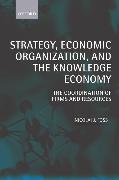Strategy, Economic Organization, and the Knowledge Economy
BücherAngebote / Angebote:
The rise of the knowledge economy has far-reaching implications for the nature of economic organization as well as firm strategy. Not surprisingly, thinking in management studies as well as in economies has been profoundly affected by these changes. Thus, management thinking in particular hasbeen increasingly characterized by a schism between those who advocate 'knowledge' or 'capabilities-based' approaches in the strategy and organization fields and those who adopt more economies-influenced approaches, notably the economics of organization. This book is a sustained attempt to overcomethis schism. Its basic argument is that knowledge-based and organizational economics approaches are not substitutes but complements. In particular, organizational economics has much to contribute with respect to furthering the understanding of efficient organization and strategy in the emergingknowledge economy. This theme is taken through several theroretical as well as empirical variations. Themes such as the incentive liabilities of flat, 'knowledge-based' organizations, the role of complementary HRM practices for fostering knowledge sharing and creation, and the role oforganizational instruments in the knowledge management activities of the multinational corporate are extensively treated. The book thus contains important implications for knowledge management, organizational design and international management. The book encompasses nine chapters which criticallyexamine current thinking on strategy, and organization. The reasoning is non-technical. While primarily aimed at a management studies audience, economists and other social scientists will also benefit from it, includingAdvanced Students, Academics and Researchers.
Folgt in ca. 10 Arbeitstagen




